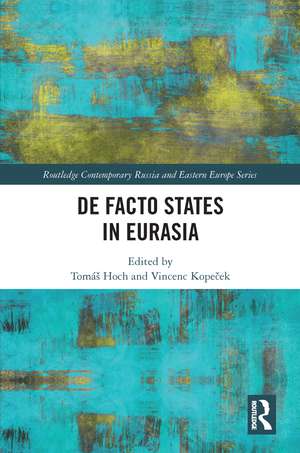De Facto States in Eurasia: Routledge Contemporary Russia and Eastern Europe Series
Editat de Tomáš Hoch, Vincenc Kopečeken Limba Engleză Paperback – 31 mar 2021
| Toate formatele și edițiile | Preț | Express |
|---|---|---|
| Paperback (1) | 395.55 lei 6-8 săpt. | |
| Taylor & Francis – 31 mar 2021 | 395.55 lei 6-8 săpt. | |
| Hardback (1) | 1005.80 lei 6-8 săpt. | |
| Taylor & Francis – 19 iul 2019 | 1005.80 lei 6-8 săpt. |
Din seria Routledge Contemporary Russia and Eastern Europe Series
-
 Preț: 309.79 lei
Preț: 309.79 lei -
 Preț: 326.49 lei
Preț: 326.49 lei -
 Preț: 326.15 lei
Preț: 326.15 lei - 9%
 Preț: 1010.71 lei
Preț: 1010.71 lei -
 Preț: 321.03 lei
Preț: 321.03 lei -
 Preț: 302.33 lei
Preț: 302.33 lei -
 Preț: 325.21 lei
Preț: 325.21 lei - 9%
 Preț: 934.70 lei
Preț: 934.70 lei -
 Preț: 318.10 lei
Preț: 318.10 lei -
 Preț: 379.30 lei
Preț: 379.30 lei - 18%
 Preț: 1111.51 lei
Preț: 1111.51 lei - 18%
 Preț: 1058.79 lei
Preț: 1058.79 lei - 25%
 Preț: 824.70 lei
Preț: 824.70 lei -
 Preț: 464.54 lei
Preț: 464.54 lei - 18%
 Preț: 950.71 lei
Preț: 950.71 lei - 18%
 Preț: 1168.76 lei
Preț: 1168.76 lei - 24%
 Preț: 130.54 lei
Preț: 130.54 lei - 26%
 Preț: 821.46 lei
Preț: 821.46 lei - 18%
 Preț: 1169.78 lei
Preț: 1169.78 lei -
 Preț: 413.98 lei
Preț: 413.98 lei -
 Preț: 387.49 lei
Preț: 387.49 lei -
 Preț: 406.52 lei
Preț: 406.52 lei - 18%
 Preț: 1059.93 lei
Preț: 1059.93 lei - 18%
 Preț: 1218.26 lei
Preț: 1218.26 lei -
 Preț: 418.13 lei
Preț: 418.13 lei - 18%
 Preț: 1171.89 lei
Preț: 1171.89 lei - 18%
 Preț: 1057.57 lei
Preț: 1057.57 lei -
 Preț: 413.37 lei
Preț: 413.37 lei - 18%
 Preț: 707.96 lei
Preț: 707.96 lei - 18%
 Preț: 1058.65 lei
Preț: 1058.65 lei - 18%
 Preț: 948.84 lei
Preț: 948.84 lei - 18%
 Preț: 706.91 lei
Preț: 706.91 lei - 18%
 Preț: 1059.84 lei
Preț: 1059.84 lei -
 Preț: 488.33 lei
Preț: 488.33 lei - 18%
 Preț: 1056.28 lei
Preț: 1056.28 lei -
 Preț: 390.12 lei
Preț: 390.12 lei - 18%
 Preț: 1053.16 lei
Preț: 1053.16 lei - 18%
 Preț: 1056.28 lei
Preț: 1056.28 lei - 28%
 Preț: 850.91 lei
Preț: 850.91 lei - 18%
 Preț: 1050.78 lei
Preț: 1050.78 lei - 18%
 Preț: 1166.68 lei
Preț: 1166.68 lei - 18%
 Preț: 1058.79 lei
Preț: 1058.79 lei - 18%
 Preț: 1958.23 lei
Preț: 1958.23 lei - 18%
 Preț: 1221.74 lei
Preț: 1221.74 lei
Preț: 395.55 lei
Nou
Puncte Express: 593
Preț estimativ în valută:
75.69€ • 80.94$ • 63.11£
75.69€ • 80.94$ • 63.11£
Carte tipărită la comandă
Livrare economică 17 aprilie-01 mai
Preluare comenzi: 021 569.72.76
Specificații
ISBN-13: 9780367785468
ISBN-10: 0367785463
Pagini: 324
Dimensiuni: 156 x 234 x 17 mm
Greutate: 0.6 kg
Ediția:1
Editura: Taylor & Francis
Colecția Routledge
Seria Routledge Contemporary Russia and Eastern Europe Series
Locul publicării:Oxford, United Kingdom
ISBN-10: 0367785463
Pagini: 324
Dimensiuni: 156 x 234 x 17 mm
Greutate: 0.6 kg
Ediția:1
Editura: Taylor & Francis
Colecția Routledge
Seria Routledge Contemporary Russia and Eastern Europe Series
Locul publicării:Oxford, United Kingdom
Cuprins
Introduction, Section 1 De facto statehood: understanding the concept, 1.1 Terminology, 1.2 De facto statehood: overview of the research, 1.3 De facto states and other unrecognized entities in Eurasia, Section 2 Russian territorial expansion and de facto states in the first half of 20th century, 2.1 Introduction to Russian and Soviet territorial expansion, 2.2 Bukharan People’s Soviet Republic: from protectorate to SSR, 2.3 Tuva and Mongolia: between annexation and independence, Section 3 The emergence of de facto states, 3.1 Factors of de facto states’ formation in the post-Soviet area, 3.2 Formation of de facto states in Abkhazia and South Ossetia, 3.3 Nagorno-Karabakh and Javakheti: two different trajectories of Armenian separatist movements, 3.4 Unfinished story of the Donetsk and Luhansk People’s Republics: towards a de facto state? Section 4 How de facto states are sustained and instrumentalized, 4.1 Factors of de facto states’ sustainability, 4.2 Unrecognized states as a means of Russia’s coercive diplomacy? An empirical analysis, 4.3 The patron–client relationship between Russia and Transnistria, 4.4 The Nagorno-Karabakh Republic and the Republic of Armenia: who instrumentalizes whom? 4.5 Inside a de facto state: forming and sustaining the Abkhazian and Nagorno-Karabakh Republic polities, Section 5 Why de facto states fail, 5.1 Possible ends of de facto states, 5.2 Explaining de facto states’ failure, 5.3 Why de facto states fail. Lessons from the Chechen Republic of Ichkeria, 5.4 The emergence and failure of the Gagauz Republic (1989–1995), Conclusion
Notă biografică
Tomáš Hoch and Vincenc Kopeček are Assistant Professors in the Department of Human Geography and Regional Development at Ostrava University, Czechia.
Recenzii
Eurasia’s De Facto States is a welcome addition to the broader literature on sovereign anomalies. It covers emerging de facto states like Donetsk and Luhansk and is historically innovative in examining early twentieth century cases. The book pursues a comprehensive life cycle analysis of the birth, life and death of de facto states. Strong conceptual frameworks drive the case study analysis. It is outstanding on not treating the Eurasian de facto states as Russian puppets but rather seeing them as polities with their own internal logics whose fates are ultimately decided by an evolving mix of internal and external factors.
– Scott Pegg, Professor, Department of Political Science, Indiana University Purdue University Indianapolis and author of International Society and the De Facto State.
– Scott Pegg, Professor, Department of Political Science, Indiana University Purdue University Indianapolis and author of International Society and the De Facto State.
Descriere
This book explores the phenomenon of de facto states in Eurasia. It examines how they are formed, what sustains them and how their differing development trajectories have unfolded. It argues that have been formed with either direct or indirect support from Russia. The book both provides detailed case studies and draws out general patterns.
